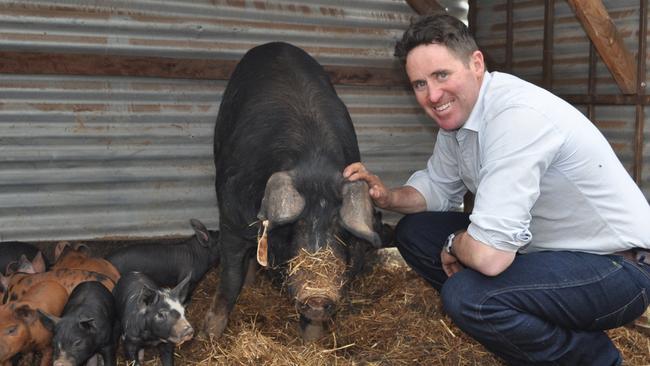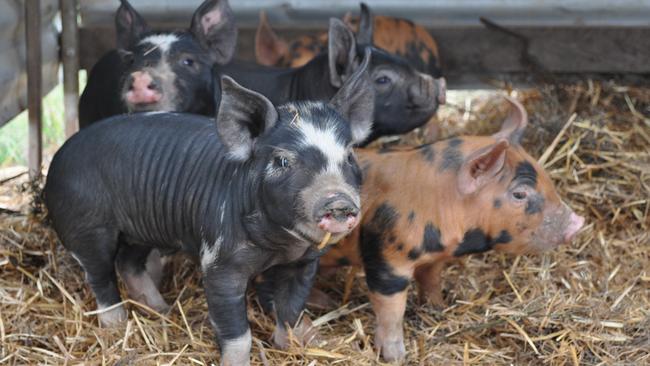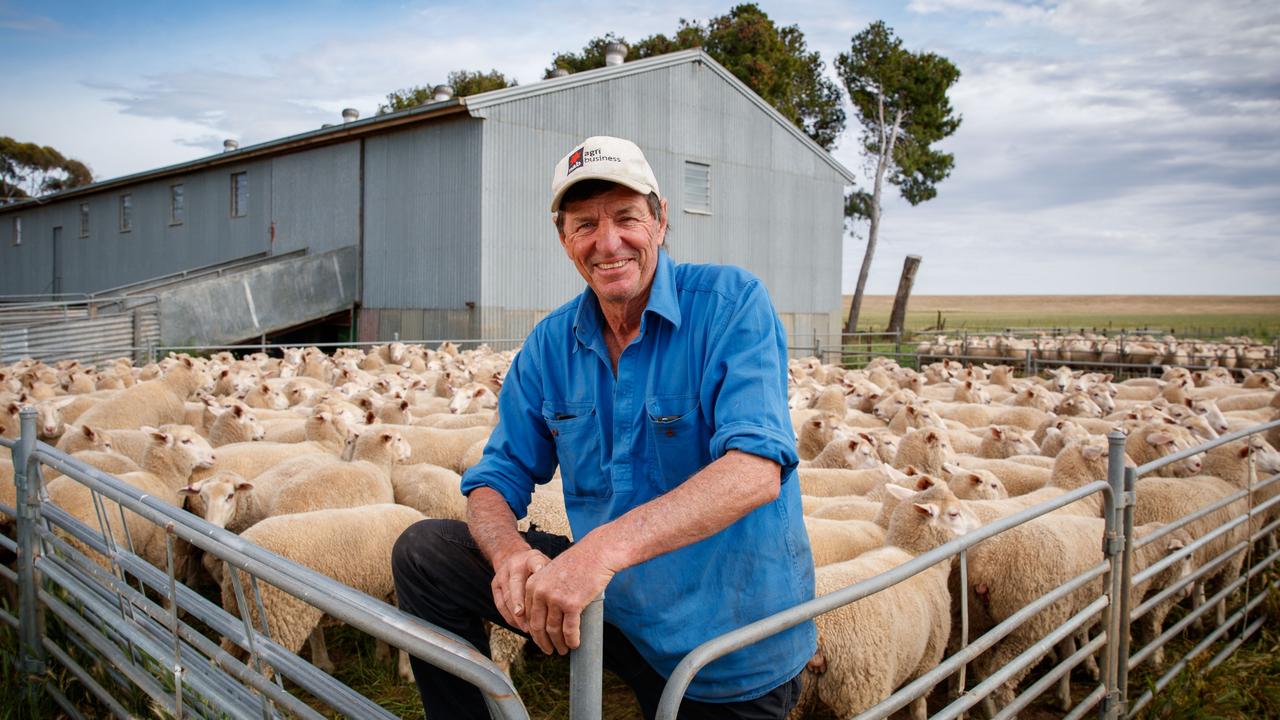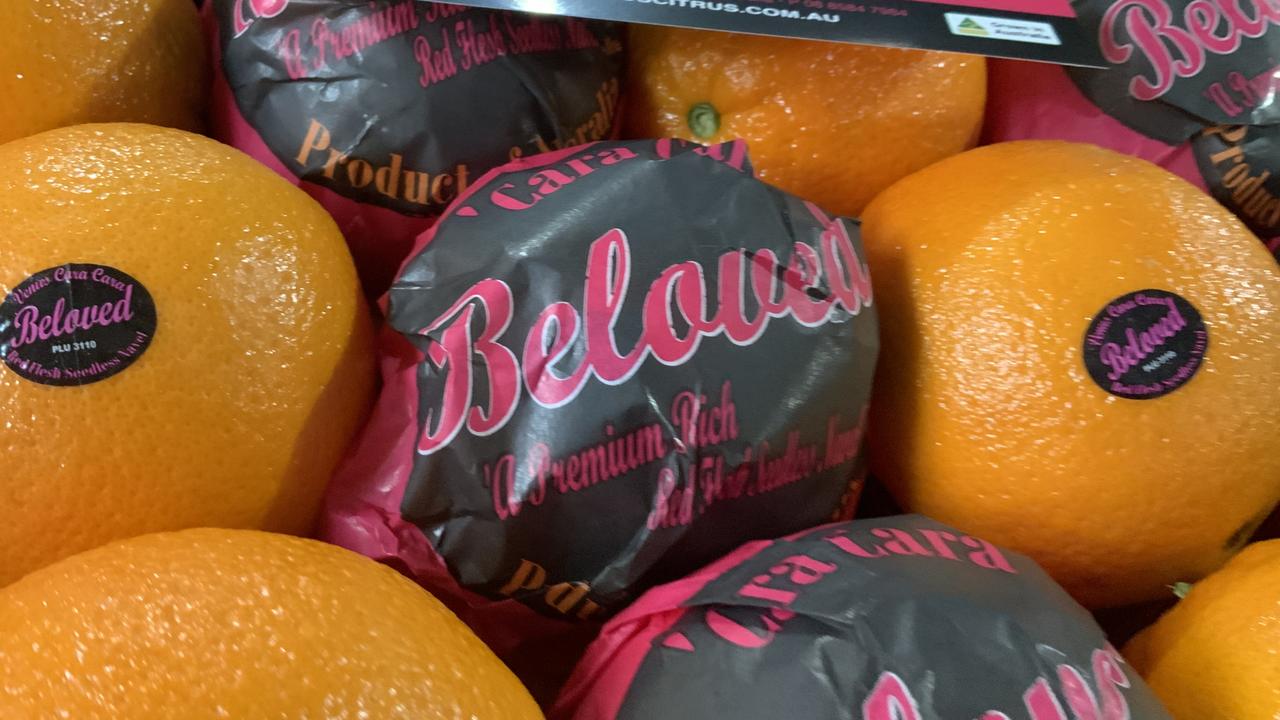Michael and Alex Hicks produce Extraordinary Pork on their free-range principles
A LIFELONG affection for pigs may not be the traditional way of choosing what farming enterprise to get in to.

A LIFELONG affection for pigs may not be the traditional way of choosing what farming enterprise to get in to but luckily for Michael and Alex Hicks, Alex’s love of pigs has paid off.
The couple run their 140ha free-range pig farm and meat brand, Extraordinary Pork, at Eumungerie, near Dubbo, in central west NSW.
Having bought the farm about four years ago, Michael a fifth-generation farmer, said they wanted a profitable farm and to direct-market some kind of livestock.
“No-one else was doing pigs in the area and Alex has loved them since reading Charlotte’s Web, so it was an easy choice,” he said.
The pigs are the heritage breed Berkshire and are run on free-range principles. That means they are “free to dig, eat grass and act like pigs”.
Michael said they had 14 sows which produced about 250 pigs a year. There are up to 100 on the farm at any time.
The Berkshire breed originated in the UK and is well-known for its meat marbling ability, good growth rates and for being quiet in nature.
“They are also black in colour which means they don’t get affected by the sun like white pigs can, especially in the hot environment here,” Michael said.
“Some other heritage breeds tend to lay down a lot of fat, but the Berkshire’s fit between the large white and other heritage breeds.

HUNGRY EYES
Michael said while the pigs grazed on grass, they were also fed a ration.
For growing pigs the average feed consumption is 1.5kg/day, starting at 1kg/day at weaning and up to 2.5kg/day at sale. At slaughter they aimed for a liveweight of 75-80kg, which equated to 50-55kg carcass weight (with no head).
Most of the pigs are slaughtered at 5 ½ to six months old.
Michael said the feed ration was designed by a nutritionist.
“It’s a complicated process and it has to have the right protein, energy and fat.”
There are no antibiotics in the feed and chemicals are avoided.
When the couple started Extraordinary Pork, they marketed the meat at the Dubbo Farmer’s Market. The couple now directly sell to customers through their Community Supported Agriculture program, supply the One 7 Eight Restaurant and Alchemy Cafe in Dubbo, and the Feather and Bone butcher shop in Marrickville, Sydney.
Community Supported Agriculture is a farm model that brings customers closer to their food. Michael said they wanted their members to see how their pork was grown, to have a connection with their food and feel reassured that the food their family ate was grown ethically, without hormones and chemicals.
GO FOR GROWTH
Extraordinary Pork produces enough to service 40 members. In its first few weeks it already had 32 members.
The Extraordinary Pork CSA members receive for their payment, one box of meat a month, free farm tours, free dog bones and member specials.
“CSA started in the US for vegetable growers who found it hard to guarantee one kind of produce, and members would agree to a $50 box of vegetables that could be made up of anything,” Michael said.
“It’s a simple process, and one of the biggest selling factors has been the farm tours. Customers want to see how their food is produced, and we want to show them.”
With an agronomy background, Michael is interested in all the layers that make up a successful enterprise. This means they have been working on creating a regenerative system that improves the landscape rather than degrading it.
“There is a link between biodiversity and a healthy profit line,” Michael said.
To improve the farm biodiversity, Michael and Alex planted 3000 trees and have built dams using PA Yeomans techniques from the 1950s as part of the farm plan.
Holistic management and stress-free stock handling were also important aspects of the farm.
Pigs are grazed on rotation and moved to a fresh paddock each week. Each paddock is rested for six to nine months.
“Pig excrement is a great fertiliser for the paddocks,” Michael said.
COMFORTABLE LIFE
The pigs are run in groups of no more than 30 and have plenty of water and shade.
“The best life possible and least stress possible is a contributing factor to better quality meat,” Michael said.
This was true even down to how they were transported to the abattoir. Michael said he transported the pigs personally to be slaughtered in Cowra.
The carcasses were then transported back to the farm to be butchered by Michael or sent directly to Feather and Bone.
Extraordinary Pork products include bacon, roasts, loin chops, ribs, sausages and fruity pork sausages. A local butcher makes the bacon and sausages.
When it comes to the breeding and genetic side of the business, Michael said they bought genetics because they were small, as well as bred some of their own.
“We like our females to have better genetics and attributes in the maternal line, while we want the bores to be big, muscly and lean.”
Michael said they had no problems with summer infertility.
“We give one cycle break between litters to ensure the sow is back to the right weight.”
Michael said the couple aimed to wean nine piglets per sow per litter and most sows had two litters a year.


